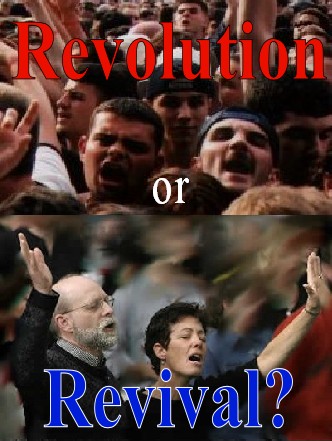 Websites
Websites
|
|
|
 Files
Files
|
|
|
|
|
Revolution or Revival?
'We need radical change; but what, I am not sure' — the words of a phone-in guest on the BBC’s Radio 4 'Today' programme this morning.
first published 16/05/2009
 IT IS THE VIEW of some historians that the Wesleyian revival saved Britain from being swept into the French Revolution of that day. Whatever truth there may be in that opinion it is probably not overstating the case to say that our nation, in this hour, is on the point of chaos spilling over into anarchy. IT IS THE VIEW of some historians that the Wesleyian revival saved Britain from being swept into the French Revolution of that day. Whatever truth there may be in that opinion it is probably not overstating the case to say that our nation, in this hour, is on the point of chaos spilling over into anarchy.
I was not alive in 1939, but I can imagine the scene as families around the country huddled around their wireless (radio) sets to hear the Prime Minister declare that the nation was at war. But we can also read of how – in miraculous ways – our surrounded troops were snatched from the Dunkirk beaches; of how the might of the German Luftwaffe was beaten by ‘the few’ and of a newspaper headline declaring in 1943 ‘The Miracle of Salerno’ in the Italian campaign.
Rees Howells and his colleagues at the Bible College of Wales travailed throughout these years in prayer for our nation before God. He said after the event: ‘In fighting Hitler we have always said that we were not up against man, but the devil.’
Let's look beyond the headlines
So we need to see beyond the chaos of greed and corruption at the heart of our financial and political systems. We need to look behind the onslaught of radicalised religionists, and the secular humanism and liberal relativism that is swamping our Christian heritage. And we need to recognise the invisible spirits that are abroad in our society when the youngest through to the most elderly are under threat to life from violence and knife attacks on the streets, medical assaults in abortion and euthanasia clinics; and the dangers to children from sexual predators who roam our streets and the modern electronic highways of a pornographic underworld.
'no country and its social order can survive if all of the pillars collapse at the same time' |
A Christian sociologist recently observed that a society is supported by a number of pillars – typically the government, the legal and law enforcement systems, the financial and business sectors and other major public institutions. And most folk can understand that.
However he didn’t stop there. He went on to say that any one country can – at any one time – survive if one or even more of these pillars weakens or collapses. |
But, he said, no country and its social order can survive if all of the pillars collapse at the same time. And it is precisely this dynamic we are seeing at work. However there is another most-vital pillar he could have mentioned. It is the pillar of ‘trust’. Trust as we know can take a lifetime to build, but trust can be totally destroyed in a moment. And this is the effect of recent news regarding our banks, the economy, (some parts of) our police and health systems and now the heart of the political and democratic mechanisms of government.
A matured perspective...
The media do not so very often invite older people to speak; broadcasters reserve their valuable air time for the powerful and wealthy of the day. However when older people are given the chance to speak we need to listen to them. They bring a longer perspective; a view that has been worked out over a lifetime. Their opinions have been formed over years of observation and reflection. And today, they are saying what everyone else is saying. They have lost heart and faith in what we see governing and ordering our lives and society.
...met with astonishing condescension
And it was totally understandable when a wave of angry protest swept through the assembled audience at David Dimbleby’s ‘Question Time’ when government minister Margaret Beckett defended the actions of grasping MPs by saying: ‘I completely understand that people can’t understand why MPs make the claims that they do.’
I’m sorry Ms. Beckett: the people understand the motives all too well; they are exactly the same as those which brought our banks to ruin whilst the top executives who caused the collapse walked off with obscene amounts of money. |

‘I completely understand that people can’t understand why MPs make the claims that they do.’ |
A highly dangerous moment
So we stand at an extremely dangerous point in history – on the point of being overrun. We are, today, no further away from a great enemy than we were 70 years ago in the May of 1939. And as always the enemy is – at the most fundamental level – a spiritual entity which is at total war with God. At the darkest moments of the Second World War, King George VI drew our nation to prayer. And the nation responded to the call.
A Christian response
Samuel Chadwick wrote:
‘Satan dreads nothing but prayer. His one concern is to keep the saints from praying. He fears nothing from prayerless studies, prayerless work, prayerless religion. He laughs at our toil, mocks our wisdom, but trembles when we pray.’
But real prayer needs to be born out of true repentance and utter dependency. It is not enough to rally a sufficient number of people in any one place at any one time to pray a stereotypical prayer. The travail in His presence that God requires is rooted in broken-heartedness; in a spontaneous and collective response as the Holy Spirit speaks and calls to the spirit within us.
So as the Spirit moves us, let us pray. Let us pray as Rees Howell and his friends prayed. Let us pray as the nation prayed at the darkest times of previous wars. As our country is now is in even greater danger: the enemy is within our gates.
So, let us pray. And let us pray realising that we are utterly dependant on God's grace – even to be moved that way.
Footnote (appended 05/24): An article published Jan. 2020 made the point that we can call for a nation to repent, but we cannot (vicariously) repent on its behalf. |
The Editor, 29/06/2012
|
|
|
|